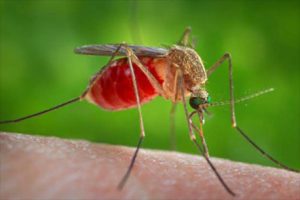You just finished mowing your lawn, then sat down in the lawn chair to watch the sunset while having a beer. You might as well put up a sign that says “Bring your proboscis, I’m here waiting!”
What’s a proboscis? It’s a tube-like mouth piece used to suck blood, using saliva to increase blood flow into that darn mosquito. The saliva gland fluids move the blood to the mosquito and may send parasites, viruses, or bacteria into the innocent but sweaty gardener. The female mosquito needs blood to develop her eggs.
Mosquitoes are relentless. They initially smell carbon dioxide (CO2) output, even from a long distance away. Once they find you, they take a whiff of your body odor, deciding if it’s appealing. Then your body heat cinches the deal. People with Type O blood will be approached twice as frequently as people with Type A. Larger folks are more in mosquito demand since there is more CO2 expelled. Pregnant women have a double chance of mosquito abuse since they are warmer and produce 21% more CO2. Mosquitoes are also clothes conscious, liking black, red, and dark blue clothing.
Emptying standing water is the quickest remedy to stop growing populations of larvae and pupae. Adult mosquitos hang out in moist areas such as overwatered garden beds. Gutters that are filled with leaves and debris are happy homes for the adults. Reducing habitat reduces the mosquito population.
We’ve established that drinking beer, being sweaty, and exhaling will bring clouds of skeeters. As gardeners, what can we do to remedy the massive hoards? Since mosquitos have better olfactory senses than a hunting dog, what has Mother Nature provided to keep them at bay? There’s a long list of plants that will make a mosquito change its flight plan.
Lemon balm and lemon thyme, with 38% concentration of citronella, is disliked. Catnip contains the chemical nepetalactone, ten times stronger smelling than DEET. Mint or peppermint, carefully planted, will help your incoming skeeters turn for prey next door. Lavender flowers will overwhelm mosquitos, confusing their desires to use their proboscis.
Charles T. Bryson, a scientist with the Agricultural Research Service (ARS), turned to wisdom from his grandfather to stop the biting insects. His grandfather used crushed leaves from American beautyberry, Callicarpa americana, under the harnesses of his draft animals. The mashed leaves created a repellent oil to ease the animals from insect attacks. The chemical, callicarpenal, is just as effective as DEET.
If you do get bit, there are many remedies. Witch hazel may reduce itching and pain. Used chamomile tea bags, placed over the bite, may soothe the sting from both mosquitoes and bees. Baking soda made into a paste, raw honey, aloe vera, will all help. If a reaction becomes more than a red bump and itching, a call to your doctor may be warranted.
Mosquitos are more than just a nuisance to outdoor life. These little flying insects are the deadliest on our planet, causing over 700,000 deaths a year due to the diseases they spread. Keeping one step ahead of them will provide safety. Let them keep their proboscis to themselves!
Julie Silva is a University of California Cooperative Extension Master Gardener of Tuolumne County.

